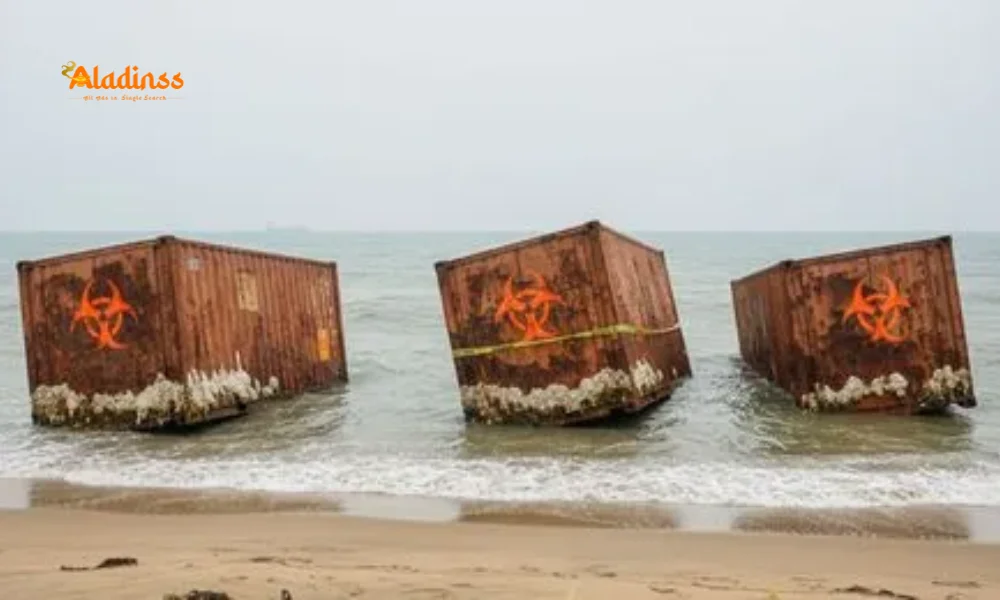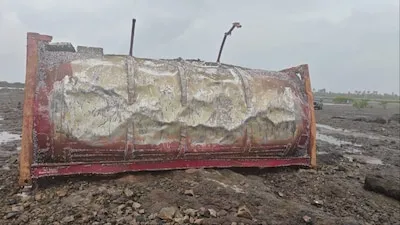Suspicious Containers Wash Ashore on Palghar Beaches, Alert Issued

Suspicious Containers Wash Ashore on Palghar Beaches, Villages on High Alert
On September 7, 2025, three suspicious containers washed ashore on the beaches of Palghar district in Maharashtra, triggering a swift response from local authorities and the Indian Coast Guard. Two containers were discovered on Satpati beach, and one on Shirgaon beach, prompting heightened security measures and coastal village alerts. The incident, reported by local fishermen, has raised concerns about maritime safety and potential environmental hazards, with authorities suspecting the containers may originate from a shipwreck or illegal dumping. This article explores the details of the incident, ongoing investigations, and the broader implications for coastal security in India.
Discovery of the Containers
The discovery occurred early Sunday morning when fishermen spotted the partially submerged containers drifting close to the Satpati and Shirgaon coastlines, approximately five kilometers offshore. By dawn, two containers had washed up on Satpati beach, a bustling fishing hub, while a third landed on the quieter Shirgaon beach, known for its serene environment and proximity to historical sites like Shirgaon Fort. The unusual sight prompted immediate action from local authorities, who cordoned off the areas to prevent public access and ensure safety.
Vivekanand Kadam, Chief of the Disaster Management Cell of Palghar, confirmed the incident, stating, “We received information about three unidentified containers being washed up on the Palghar coast. Two were found near Satpati beach and one on Shirgaon beach.” The containers’ sudden appearance sparked alarm, given their unknown origin and contents, which could range from benign cargo to hazardous materials. The incident follows a similar event earlier in 2025, when a container washed ashore on Vasai beach, raising concerns about maritime safety along Maharashtra’s coastline.
Challenges in Inspection
Efforts to inspect the containers were hampered by challenging tidal conditions. High tides and rough seas made it difficult for authorities to access the containers, which remained partially submerged. Kadam noted, “Due to high tide, it is currently difficult to access and examine the containers. We are coordinating with the Coast Guard to ensure a safe and controlled recovery operation.” The rising sea levels, a recurring issue along India’s western coast during monsoon season, complicated the logistics of retrieving and inspecting the containers, delaying critical assessments of their contents.
To address potential risks, bomb disposal and hazardous materials teams were placed on standby, ready to intervene once conditions allowed. The Palghar Police and Indian Coast Guard launched a joint operation to secure the sites, with maritime experts analyzing shipping logs and coastal surveillance data to trace the containers’ origins. Preliminary suspicions point to a shipwreck, possibly the MV Phoenix 15, a cargo vessel that sank off Oman’s coast in August 2025, releasing dozens of containers into the Arabian Sea. However, no official confirmation has been provided, and authorities are exploring all possibilities, including illegal dumping or smuggling.

Heightened Security Measures
In response to the incident, the district disaster management team placed coastal villages, including Satpati, Shirgaon, Mahim, and Vadarai, on high alert. Beach patrolling was intensified, with police and Coast Guard personnel conducting round-the-clock surveillance to prevent further incidents and ensure public safety. Kadam emphasized the seriousness of the situation, stating, “We are not ruling out any possibilities at this stage. Investigations will look into whether these containers were part of cargo lost from ships during rough seas or due to illegal dumping.” The heightened measures reflect India’s growing focus on coastal security, particularly in light of past incidents involving suspicious vessels and smuggling.
The Indian Coast Guard, a key player in maritime law enforcement, deployed additional resources to support the investigation. With jurisdiction over India’s territorial waters, the Coast Guard is coordinating with maritime authorities to analyze shipping routes and identify any vessels that may have lost cargo in the Arabian Sea. The operation underscores the challenges of securing India’s 7,516-kilometer coastline, which spans nine states and four Union Territories and is vulnerable to smuggling, illegal dumping, and other maritime threats.
Community and Environmental Concerns
The incident has sparked significant concern among local fishermen and residents, who rely on Satpati and Shirgaon beaches for their livelihoods. Satpati, one of India’s largest fishing hubs, is home to numerous fishing villages, while Shirgaon, known as a fisherman’s village, supports a vibrant seafood industry. Residents fear that the containers could contain hazardous materials, posing risks to marine life and coastal ecosystems. “We’ve never seen anything like this before. If these containers have chemicals or waste, it could harm our fishing grounds,” said a local fisherman, Ramesh Patil, speaking to reporters.
Environmentalists have also raised alarms about the potential ecological impact. India’s western coast, part of the Arabian Sea, is a critical marine biodiversity hotspot, supporting species like Olive Ridley turtles and various fish populations. Unidentified containers could leak toxic substances, threatening marine ecosystems and coastal tourism. The district administration has assured residents that experts will assess the containers for environmental risks once they are safely retrieved, but the uncertainty has heightened local anxiety.
Historical Context and Coastal Security
The Palghar incident is not isolated, as Maharashtra’s coastline has faced similar challenges in recent years. In July 2025, a suspicious boat, initially thought to be Pakistani, was spotted off Raigad’s Revdanda coast, later identified as a fishing net buoy with a transponder. In October 2024, another suspicious vessel was sighted near Chikhle village in Palghar’s Dahanu taluka, prompting a Coast Guard helicopter search. These incidents highlight the vulnerabilities of India’s coastal regions, which have historically been targets for smuggling, illegal fishing, and even terrorist activities, as seen in the 2008 Mumbai attacks.
India’s 3,331 coastal villages and 1,382 islands, including Palghar’s fishing communities, rely on robust maritime security to protect their economic and environmental interests. The government has invested heavily in coastal surveillance, with initiatives like the Coastal Security Scheme and the deployment of advanced radar systems. However, incidents like the Palghar containers underscore the need for enhanced monitoring and rapid response mechanisms to address maritime threats effectively.
Ongoing Investigations and Future Steps
The joint investigation by the Palghar Police and Indian Coast Guard is focused on determining the containers’ origins and contents. Authorities are analyzing shipping logs, satellite data, and regional maritime traffic to identify any vessels that may have lost cargo. The possibility of illegal dumping, a growing concern in international waters, is also under scrutiny, as unregulated disposal of waste or hazardous materials poses significant risks to coastal communities. Kadam assured reporters that “all necessary agencies are working together to assess and resolve the situation,” emphasizing a coordinated approach to the crisis.
As the investigation progresses, local authorities have urged residents to remain vigilant and report any suspicious objects along the coast. The district administration is also collaborating with environmental agencies to prepare for potential cleanup operations if the containers are found to contain hazardous materials. The incident has reignited discussions about strengthening India’s coastal security framework, with calls for increased funding for surveillance technology and training for local law enforcement to handle maritime emergencies effectively.
Comment / Reply From
No comments yet. Be the first to comment!











